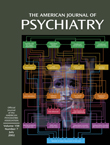Dr. Franko and Colleagues Reply
To the Editor: We agree that the lack of a comparison group is a limitation of our study and acknowledged this in the article. With regard to postpartum depression, we also noted that all of the women with postpartum depression had a lifetime history of affective disorder. Earlier work with this cohort found that 66% of the anorexic subjects, 50% of the bulimic subjects, and 76% of the mixed anorexic-bulimic subjects had at least one affective disorder at the time of intake and that depression was common in the group over the course of the study (1, 2).
Depression was measured every 6 months—before, during, and after pregnancy—by structured clinical interview. Depression in the 6 months before pregnancy was not predictive of postpartum depression, suggesting that those who had postpartum depression, in fact, were not depressed just before pregnancy. In addition, because medical records corroborated the subjects’ reports of depression in the clinical interview, we feel confident that our assessment identified those with postpartum depression. However, we agree that the use of an instrument specifically designed to assess postpartum depression would have been optimal and that including a more explicit assessment than we provided would strengthen future studies. We hope that our study will lay the groundwork for additional research on postpartum depression and eating disorders.
1. Herzog DB, Nussbaum KM, Marmor AK: Comorbidity and outcome in eating disorders. Psychiatr Clin North Am 1996; 19:843-859Crossref, Medline, Google Scholar
2. Herzog DB, Keller MB, Sacks NR, Yeh CJ, Lavori PW: Psychiatric comorbidity in treatment-seeking anorexics and bulimics. J Am Acad Child Adolesc Psychiatry 1992; 31:810-818Crossref, Medline, Google Scholar



